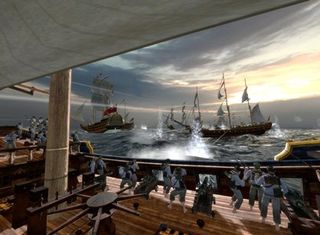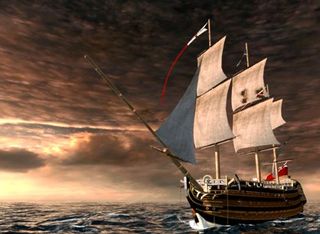Empire: Total War
Declaring war on our RTS expectations
As the game has been in development since CA completed the Barbarian Invasion expansion for Rome: Total War in September 2005 (Med II was made in their Australian office), there has been plenty of time for the team, now numbering around 40, to ensure naval combat is given the spectacular treatment it deserves - more of which later. Still, though, how much technological development can you get in just one century? One of the joys of Medieval II is creeping up the tech tree, gradually uncovering devastating units to use on the battlefield and more useful structures in your cities. Surely one musket is as good as another?
Hardly. Units vary more than ever, and improvements are gradually discovered. Nor is there any need to keep sending units back to retrain, as new technology is rolled out automatically. More efficient bayonets, better ammunition and more reliable muskets can be researched if you focus your economy in the right areas. Neglect to do so, and your men will be using plug bayonets that prevent the soldier from firing and stabbing, while your enemy has moved on to higher tech.

Research is not just about economy, though, as James Russell explains. “There are all sorts of ways to improve your technology, but you have to play the game according to the strategy you choose - for example, you may have to reform your government to research more effectively.” There are three types of government you can establish across your empire (the names and details for each are yet to be finalised), and each has a broad impact on your economy and populace - but also on the type of military materiel you can develop. And with sea power so important to expanding your empire, you’d be mad not to improve your ability to fight at sea. Each faction has the potential to build between 10 and 20 types of ship. Depending on how you prioritise your research, you will also have the chance to field technology that didn’t actually appear until well into the 19th century, such as steam-powered vessels.
Ranged combat obviously played a part in the previous Total War games, but in the 18th century gunpowder came into its own on the battlefield. Most infantry (and plenty of cavalry for that matter)were equipped with muskets and even early grenades, and artillery use was widespread, more powerful and more accurate than ever before. So battles were long-range, stand-off affairs, rather than the toe-to-toe brawls we know and love. Right?

Not quite. Poor reload times and short effective ranges mean that armies are most effective up close; decisive victories can’t be won without getting your hands bloody. James Russell again: “Although we’re focusing on gunpowder quite heavily there’s still a lot of visceral melee going on. It gives the player a choice: whether to hang back and fire or charge in.” Firing drills which get the most lead in the air as possible, and formations which allow the maximum number of men to fire, will get the most from your musket-equipped forces, but remember: this was the age of the bayonet.
Ever been frustrated that you can’t get inside any of the buildings on a Total War battlefield? That’s changing. “The tactics in Empire reflect the changing nature of warfare,” says James. “Cover becomes far more important. It’s the ideal time for us to allow battlefield buildings to be occupied.” Once troops are inside, or ordered to set up behind a wall, you’ll have command of the territory you can cover with your arcs of fire. It’s not quite like Company of Heroes’ capture points, but you’ll quickly realise how important it is to seize these battlefield features. “Battles are full of charges, counter-charges and vicious melees for these tactical areas,” says James. “Buildings give an area of focus. We don’t want to create obscure tactics for players to learn; the game will reflect intuitive actions such as it obviously being better for your line infantry to stand behind a wall and shoot.”
Sign up to the GamesRadar+ Newsletter
Weekly digests, tales from the communities you love, and more

Massive Stalker 2 patch starts chipping away at the notoriously glitchy game's worst problems, including over 80 cutscene problems and nearly 2,000 more bugs
Batman V. Superman star Jesse Eisenberg thinks that playing Lex Luthor in the poorly received film "hurt [his] career in a real way"

Preview Grant Morrison and Matt Fraction's one-page horror stories from Ice Cream Man #43
Most Popular



